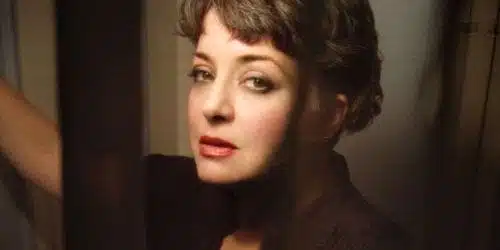
Kelly Hogan is not the kind of singer who has many casual fans, only devotees. Nor has her music career followed anything like a straight line. Indie guitarist, radio DJ, backup singer, bartender—she’s done it all. Along the way, she’s worked with musical heavy hitters such as Neko Case, Andrew Bird, Vic Chesnutt and John Wesley Harding, but rarely in a way that grabbed the spotlight for herself. She had the misfortune to release her first solo album, Because It Feels Good, just after 9/11, where it, along with her subsequent tour, was lost in the midst of a national crisis. So perhaps it’s fitting that she has titled her second album I Like to Keep Myself in Pain.
The album wasn’t initially Hogan’s idea (credit her label Anti- for approaching her) and it began in typically humble fashion – she would seek songwriting contributions from friends to piece together a record. However her initial modesty was met with overwhelming response from around the music world, allowing her to turn it into a wildly ambitious project featuring songs from M. Ward, Jon Langford and Robyn Hitchcock, to name but a few, recorded with a band that includes drummer James Gadson (Bill Withers, Beck), bassist Gabriel Roth (the Dap-Kings), Chicago guitar icon Scott Ligon (NRBQ) and the immortal Booker T. Jones on keys. It’s not every album that’s able to lose a Jeff Tweedy song (his offering, “Open Mind”, ended up on the most recent Wilco effort instead) and be none the worse for its absence.
What holds I Like to Keep Myself in Pain together is Hogan’s musical instinct. They allow her to shift effortlessly between different styles (folk, jazz, pop, country, etc.) without seeming schizophrenic. Her willingness and ability to serve the song allows her to blend in seamlessly when singing behind others, but, solo, it becomes a defining asset. Whether it’s the classic country romantic paranoia of Robbie Fulks’ “Whenever You’re Out Of My Sight”, the upbeat pop of Jon Langford’s “Haunted” or understated classicism of the Handsome Family’s “The Green River Valley”, Hogan’s versatility and lack of ego allow her to own each song while also making each one seem totally unlike the others.
A Georgia native, Hogan came to Chicago in the late ’90s, to allegedly quit music, but instead ended up working as a publicist for Bloodshot Records and tending bar at the hipster-dive mecca the Hideout. There she met and collaborated with another non-Chicagoan, Andrew Bird, who contributed (along with co-writer Jack Pendarvis) “We Can’t Have Nice Things”, a song whose ethos perhaps best exemplifies the record’s strengths. Coasting in on an airy Booker T. intro and carried by a Gabriel Roth bassline, it’s a lilting, upbeat number about coming to grips with the disappointments of life. When Kelly Hogan sings of her meager accomplishments and possessions, “still, I’d rather have these things than nothing”, the sentiment carries genuine comfort.
Other standout songs include M. Ward’s Frank and Nancy Sinatra travelogue “Daddy’s Little Girl”. Although she claims not to be a Sinatra fan, Hogan delivers classic one-liners (“New York you were my endless song / Berlin you were my bombshell blonde”, etc.) in a breathy hush that would have made Old Blue Eyes take notice. “Plant White Roses” by Stephin Merritt comes closest emotionally to her familiar country ballad territory, which is fitting, given her weepy cover of the Magnetic Fields’ “Papa Was A Rodeo” on her 2000 album Beneath the Country Underdog. The record’s first contribution was a song from the late Vic Chesnutt, “The Ways Of This World”. With its dark-hued nostalgia about life and lost innocence, it made a large impact on Hogan, who has said she remembers listening to the original demo and thinking, “How did he know my entire life?”
For a woman who tried quitting music and instead ended up clinging to the background for years, it seems only fitting that the record’s true standout song is the one she penned. “Golden” was nominally written for Neko Case but, as Hogan has said at recent live shows, it is also a more general “you go, y’all!” song (and God bless her heartfelt, Southern embrace of a gender-neutral, second-person pronoun, might I add). “So go on, show ‘em what you’re made of” she sings, “someday you and all you put your hand to will turn golden”. Just then, as a laid-back yet passionate guitar solo appears before giving way to an equally adroit Booker T. organ interlude, it’s hard not to apply the sentiment to the singer herself. After a career spent paying her dues, it’s exhilarating to see Kelly Hogan step so effortlessly into a spotlight of her own.

